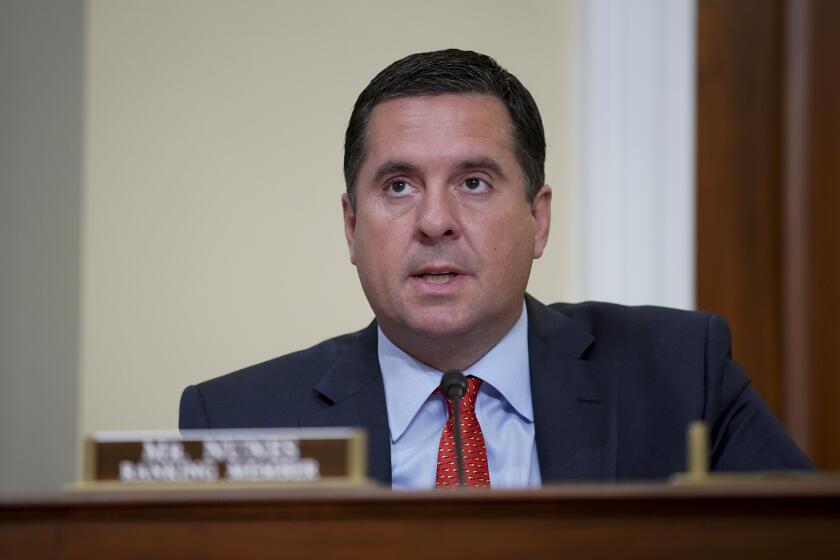President-elect Donald Trump has made significant appointments from California for his forthcoming administration, among them former San Joaquin Valley congressman Devin Nunes, who has taken a prominent role within the Trump Media & Technology Group as its chief executive. Nunes, a Republican and ex-dairy farmer from Tulare, resigned his congressional seat in 2022 after nearly two decades of service. His new role as chairman of the President’s Intelligence Advisory Board, as announced by Trump on Truth Social, will see him tasked with advising the president on intelligence matters. The board operates independently and possesses access to all necessary information, eliminating the need for Senate confirmation for its members. Trump’s endorsement highlights Nunes’s previous leadership as chair of the House Intelligence Committee and his efforts in debunking allegations of Russian collusion during the 2016 election, underscoring the close ties between Nunes and Trump.
Nunes has gained notoriety as a loyal supporter of Trump, particularly during the investigations into Russia’s interference in the 2016 election. His efforts to protect Trump from allegations, especially in the face of criticism from Democratic counterpart Adam Schiff, significantly shaped the narrative during that tumultuous period. Trump emphasized that Nunes’s past experience would be beneficial in providing independent assessments regarding the performance and integrity of U.S. intelligence agencies. Moreover, Trump has also appointed other affiliates from Trump Media to key positions, signifying a trend of placing loyalists in strategic roles, with selections such as wrestling mogul Linda McMahon for Education Secretary and Kash Patel for FBI Director, further reinforcing the tightly-knit loyalty within the administration.
Nunes expressed enthusiasm for his new responsibilities on social media, articulating an eagerness to collaborate with other Trump administration nominees to restore integrity and focus within the intelligence community. He noted the importance of directing efforts towards national security and the dismantling of threats. In a landscape marked by mistrust in governmental agencies by parts of the conservative base, Nunes’s approach is indicative of Trump’s broader strategy to align his administration with individuals who bolster his agenda and cater to the expectations of his supporters. This focus reflects Trump’s intent to present a cohesive team aimed at revitalizing confidence in national security operations.
In addition to Nunes, Trump appointed Richard “Ric” Grenell as his envoy for special missions, a newly established role that emphasizes the need for trusted allies in volatile regions worldwide. Grenell has previously occupied high-profile positions such as acting director of national intelligence and ambassador to Germany. His outspoken nature and controversial maneuvers during his prior tenure have earned him both staunch supporters and pointed critics. Grenell’s statements on social media and his direct confrontations with international leaders reveal a combative approach to diplomacy characteristic of the Trump administration. His task will include efforts in places such as Venezuela and North Korea, illustrating Trump’s ongoing emphasis on global engagement backed with a hardline approach.
However, Grenell’s controversial stance on various issues, particularly regarding LGBTQ+ rights, has drawn significant scrutiny and protests from lawmakers within California. His public conflicts with the Democratic contingent reflect the polarized political climate that continues to encapsulate California’s legislative conversations. Criticism from members of the LGBTQ+ community and allies has pitted Grenell against fellow local leaders, showcasing the challenges faced by Republicans in a predominantly Democratic state. Despite this, Grenell remains firm in his support of Trump, vowing to prioritize American interests through a steadfast approach to foreign policy.
Lastly, Trump has selected former Los Alamitos Mayor Troy Edgar as deputy secretary of Homeland Security, affirming the trend of surrounding himself with individuals aligned with his hardline immigration policies. Edgar’s background as an IBM executive and prior service in the Trump administration exemplify the blending of private sector experience with governmental roles. His tenure as the mayor of a city known for its revolt against California’s sanctuary state policies further cements Edgar as a favorable choice for Trump, who has long targeted activist local governments for their non-compliance with federal immigration laws. This appointment reflects a broader strategy aimed at addressing Trump’s priority issues, particularly in relation to immigration enforcement and local governance compliance.
Throughout these appointments, Trump is reinforcing a narrative of loyalty and shared ideology within his forthcoming administration, emphasizing the pivotal role of California figures in his vision. Nunes, Grenell, and Edgar each embody aspects of Trump’s persona and political objectives, from the core disputes over immigration to the commitment to reshape intelligence agencies. The strategic selections reveal Trump’s intent to not only fill positions with compatible personnel but also to ensure a continuity of messaging that resonates with his base. The trust in familiar allies reflects Trump’s ongoing strategy of governing through a coalition of likeminded individuals, promoting an agenda designed to confront opposition and prioritize the interests of his supporters, ultimately positioning the upcoming administration for battles ahead in a polarized political environment.

